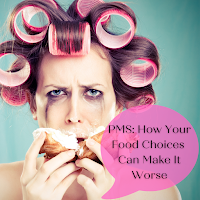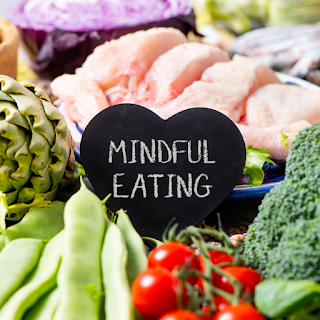PMS: How Your Food Choices Can Make It Worse
How Are Those Donuts Treating You....?!

Premenstrual syndrome, also known as PMS, is a group of physical and emotional symptoms that some women experience before their periods.
These symptoms can include abdominal cramps, headaches, bloating, fatigue, and food cravings.
While the exact cause of PMS is unknown, many factors may contribute to the severity of these symptoms, such as stress or weight gain.
Women who have experienced PMS for years often develop coping strategies to help lessen their symptoms.
Here are some clever food tips to help you manage your PMS with your diet.
How can your food choices affect your PMS symptoms?
.png)
Some studies show that the consumption of certain foods, such as high-sugar items, can worsen PMS symptoms.
If you are looking for some ways that work to manage your PMS with your diet, here are some tips:
- Find out if you have a food intolerance and avoid those foods.
- Eat smaller meals throughout the day to help regulate blood sugar levels.
- Consider skipping caffeinated beverages or alcohol, as they may worsen PMS symptoms too.
- Eat a well-balanced diet with plenty of protein, fibre, and healthy fats.
- Try eating more fresh vegetables, fruits, and whole grains during this time of the month to help replenish nutrients lost during menstruation.
What are some foods that might make it worse?
.png)
One factor is your diet.
Certain foods may worsen your PMS, while others may help ease symptoms.
Here are some foods that might make it worse:
- Sugar: Foods high in sugar can cause an increase in insulin levels, which can lead to increased cramps or headaches.
- High-fat foods: These foods may contribute to weight gain and bloating, which may worsen PMS symptoms.
- Caffeine: The caffeine in coffee and soda can cause a spike in adrenaline levels and trigger anxiety, which makes PMS worse.
- Alcohol: Alcohol can worsen depression and mood swings associated with PMS. It also increases bloating and irritability.
- Artificial sweeteners: These substances can alter the gut bacteria balance and lead to inflammation, worsening premenstrual syndrome symptoms.
What can you do to manage your PMS through diet?
.png)
Firstly, eat lots of fresh fruits and vegetables. This will help detoxify the body and reduce inflammation which may contribute to PMS symptoms.
Secondly, drink plenty of water. You should be drinking at the very least 8 glasses a day to stay hydrated during your cycle.
Thirdly, avoid sugary snacks such as candy bars and cookies that aggravate mood swings and add unnecessary sugar to your diet.
Fourthly, consume small portions of protein-rich foods like grilled chicken or fish because they reduce bloating and water retention, two common causes of PMS symptoms.
Lastly, stay away from salty foods or anything high in sodium as it can lead to dehydration during your cycle, which will worsen your PMS symptoms.
Conclusion
Being proactive in managing your PMS through diet can significantly impact your quality of life, especially when it comes to managing your symptoms.
If you are finding that your PMS symptoms are more severe, it might be a really good idea to speak with a specialist healthcare professional about other strategies to manage and cope with your symptoms.

Comments
Post a Comment